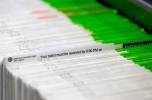Good news for Democrats in voter registration numbers
Numbers are not destiny in politics, and Republicans in Nevada should be glad.
The fact that Republicans have 55,716 fewer active registered voters as of August than the Democrats is well-known. But a deeper look at the numbers shows some other surprising details.
For example: The increase in the number of nonpartisan voters signing up has surpassed the number of Republicans every single month since February. And nonpartisans aren't even an organized political party!
Democrats, meanwhile, have more than doubled the number of Republican registrations in every month since May. They have netted more than twice the number of Republican net voters between February and August, a feat made all the more impressive after they lost twice the number of voters in a reorganization of voter rolls that took place in March.
In Clark County, the net voter gain is stark: Democrats have more than 11,500 more voters now than they did in February; Republicans have only 1,758. In Washoe County, Democrats added 1,843 more voters to the rolls than they had in February, while the GOP added 1,548. But overall, Republicans still enjoy a 3,400-voter advantage over Democrats in what will surely be a key county.
In part, the disparity has to do with machine politics: The Democrats' organization has been in place since the middle of last decade, a machine that well served President Barack Obama in 2008 and Sen. Harry Reid in 2010.
On the other side, Republicans have had virtually no registration machine, as their party has been divided by fights between supporters of Texas Rep. Ron Paul and establishment types recoiling at the idealism and tactics of the upstarts. The lack of trust between the two sides prompted the Republican National Committee and the Mitt Romney campaign to form Team Nevada, essentially a shadow Republican Party tasked with the jobs normally assigned to the state party, including registering voters. (One wonders what would have happened without Team Nevada's efforts!)
Republicans note that numbers don't automatically mean Democrats will win the state; they note that the party had a 60,000-voter advantage in 2010, yet still lost the governor's race, and only won a high-profile U.S. Senate contest by 41,000 votes. "Candidates matter," says one Republican.
Indeed, that's true: Brian Sandoval was a picture-perfect Republican candidate, and Sharron Angle ran one of the worst statewide campaigns ever seen in Nevada history.
But 2012 is not 2010 - this is a presidential election year, when turnout among all groups will be much higher than it was two years ago. That means numbers will matter more than they did then. Not only that, but it's not unfair to read a higher degree of momentum into the Democratic numbers than into the Republican ones.
That's especially true after the Republican National Convention, when Paul-backing delegates saw last-minute rules changes enacted to deny them a chance to put Paul's name in nomination on the floor. Their protest vote for Paul - even though most of the delegates were supposed to vote for Romney - may not be the last sign of a lack of enthusiasm for the Republican nominee.
A final reality: Republicans are out of time to make up the gap. Mail-in voter registration ends Oct. 7. You can still register in person at an election office until Oct. 16, but that's the final deadline. That means the GOP has just more than a month to dig out from a 55,000-voter disadvantage, when their biggest gain in a single month is 5,042. Meanwhile, Democrats added more than 12,000 voters last month.
Numbers aren't destiny, which is good news for the Republicans.
Steve Sebelius is a Review-Journal political columnist and author of the blog SlashPolitics.com. Follow him on Twitter (@SteveSebelius) or reach him at (702) 387-5276 or ssebelius@reviewjournal.com.























